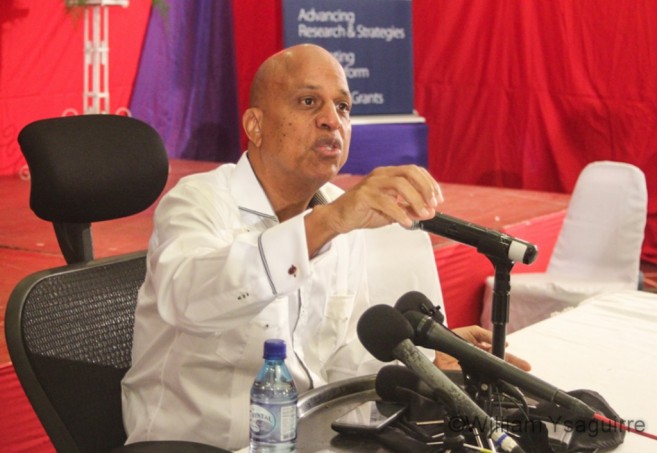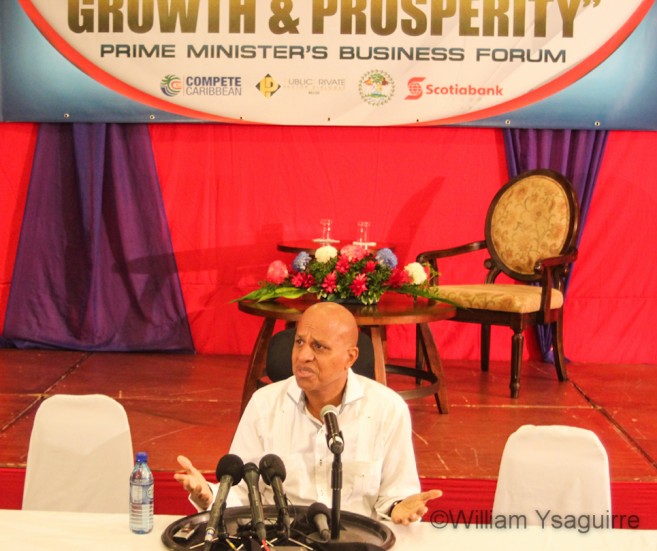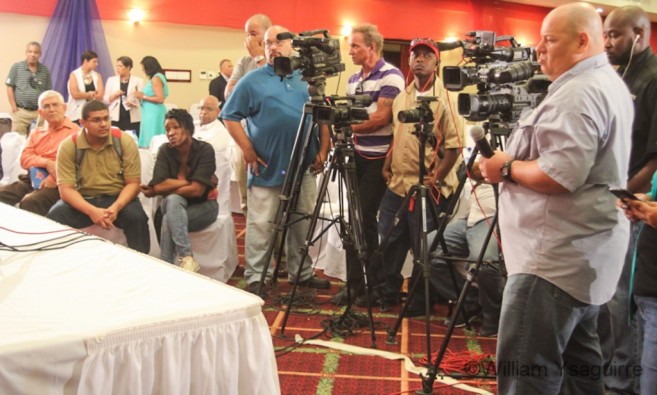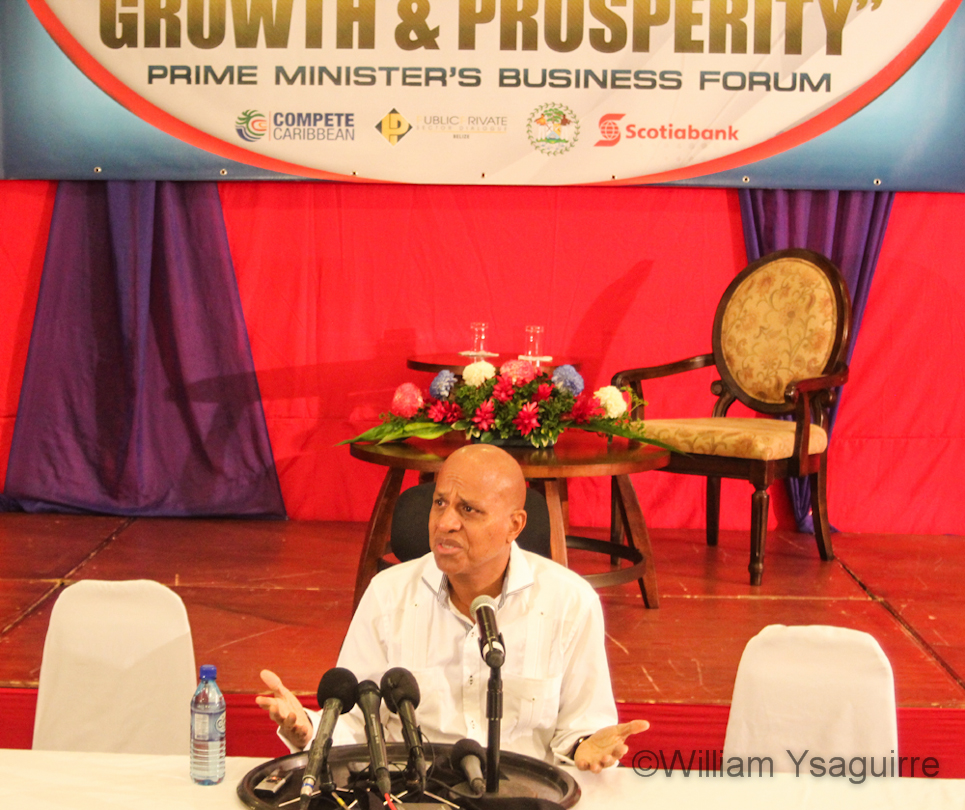Taxation, the management and transfer of land assets, and speeding up government processes were key reforms requested by the business sector from the Government of Belize (GOB). Belize Trade and Investment Development Service (BELTRAIDE) has established the Economic Development Council to create a “Partnership for Growth and Prosperity”, and Prime Minister Dean Barrow presented the government’s report card on reforms at his 4th annual Business Forum, at the Biltmore Plaza Hotel in Belize City on Thursday, October 8.
The business sector has been clamoring for cheaper and faster Internet bandwidth to speed up and reduce the cost of doing business, and also for government to set up a ‘one-stop shop’ where all trade and other business licenses could be obtained in an expedited fashion, the ideal being for all the necessary documentation to establishing a business to be made possible within 24 hours, and if possible, online. The business sector has been pushing for this reform to make government, not only more efficient, but more transparent and less susceptible to corruption.
In this regard GOB has readied an E-government Policy, Strategy and Action Plan form October 30, 2014, but it awaits Cabinet approval. The proposal to expand the bandwidth of online government services has been submitted to the Financial Secretary, and is also awaiting approval.
The Government’s data center is the Central Information Technology Office (CITO), established in October 2013 and completed this year, which has achieved international ISO-27001 certification in June, and is now working to get a Belize Electronic Licenses and Permit System up and running. So far the Supplies Control module is complete and working; and CITO is working on the Fisheries and Forestry module, scheduled for completion by the end of this month. It has already interconnected the databases for Vital Statistics Offices countrywide, and is about to begin the business module – dealing with Agriculture and the Belize Agricultural Health Authority (BAHA – phyto-sanitary certificates) – scheduled for completion by mid 2016. A third phase is also scheduled for completion by the end of next year.
GOB reports that it has a Modernization of the Public Service (MPS) Strategic Plan (2014-2017), with equity and fairness being an important part. It has also added new members, including an attorney to the Public Service Commission, to improve its effectiveness and a draft policy and strategy for Quality Assurance and Customer Service is near completion, after which it goes to Cabinet. CITO has also created and is managing a Human Resource module to monitor public employees’ personal info, on their training, promotions, transfers and other service information. The MPS will first establish a benchmark of current status, so as to then be able to measure any future progress.
Another sore issue addressed is a reform in the process of land management. Real estate brokers have taken the lead by proposing a new process for land sales with greater transparency. The Real Estate Association had prepared a draft Real Estate Bill, which is presently under review by the Ministry responsible for lands and the Solicitor General’s office, which should go to Cabinet by the end of next month and be ready to be tabled in the House by February 2016.
The Ministry of Natural Resources and Agriculture also began a land reform process a year ago, but reports its only half done. An electronic database of encumbrances on land is already established and working, and a National Spatial Data Infrastructure (NSDI) cadastre is being established, but it’s a work in progress. In terms of speeding up the land lease and purchase process, a conflict resolution committee has been appointed to address problems in Land Titles and Registry, in National Estates, and Land permits. The committee meets every fortnight, reviews all conflicts and submits recommendations to the Minister. GOB has also obtained funding from the World Bank to update the existing Land use Policy; in the future NSDI would help planners determine how best to use the land available.
The Business Sector had also called for a reform of the Land Tax system, particularly with how Land Tax is assessed. The Solicitor General is assisting the ministry in a review, begun in August this year, of the existing system; a draft amendment hopefully may be ready by the end of next month, and be ready for the House by early next year.
The private sector had also indicated a preference for a tax on profits as opposed to the existing Business Tax, particularly the tax rates for fuel dealers. GOB reports that a comprehensive Trade and Tax review is underway, and is expected to be completed by the end of next month. Business people are also clamoring for prompt processing of refunds under the General Sales Tax (GST) system, and Barrow has made it GOB policy to handle GST refunds speedily, except where they need to be audited, in which case the time period may be extended to maximum six months.
Government has also developed an agriculture and food strategy and a business strategy which would guide investment. The terms of reference for an investment policy and strategy are just being developed. Once these are ready, the plan is for government and private sector to work jointly on an investment plan fir Belize.
The government-private sector partnership would also address many other development issues, such as adjusting the curricula of Belize’s educational system to meet the country’s economic development needs, at the level of ITVETs and at the University of Belize.
The public-private sector partnership will also consider the passage of legislation to formalize GOB’s position and support for the aquaculture, sugar and citrus industries.
The private sector has also called for better roads and a better transportation system to move both goods and people. The Ministry of Energy, Science, Technology and Public Utilities (MESTPU) reports that it has, with support from the Korea Development Institute, developed a national transportation master plan, and a national strategy and action plan for Science, Technology and Innovation. A plan for Belize to develop sustainable sources of energy to make Belize not only self-sufficient in energy, but also a net exporter of energy is still in the planning stages, although Belize has already received international support and funding from the European Union to pursue this course.

Share
Read more

